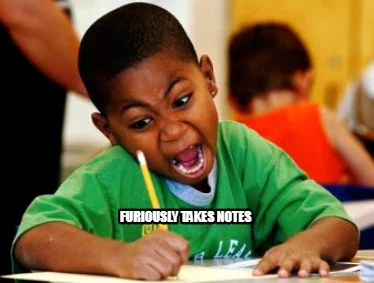I wrote a blog post about the importance of writing stuff down. I want to write a follow-up for a particular kind of writing: taking notes in meetings.
You will attend a lot of meetings throughout your career. Some of them will be good meetings, and some of them will be bad meetings. I have observed that the best meetings have someone officially taking notes.
Having someone taking notes helps make your meeting more effective. You will have a written record of items discussed that can be shared with those who attended the meeting and those who were not.
Meeting notes are an excellent place to capture action items from the meeting. An explicit list of people assigned action items ensures clarity regarding the next steps. Otherwise, people might not remember who is supposed to do what, especially if it was just said out loud once.
If you are having a follow-up meeting, the notes will help save time because everyone can quickly recap the previous meeting’s status.
The last thing I have observed is that teams that take great notes encourage people who do not feel they need to be in a particular meeting to skip it to do other, more meaningful work. Good notes should be enough to keep you “in the loop” if you need to stay informed.
How do you get someone to become a note-taker? And how do they get good at it? As with just about anything else, you need to practice. Taking notes in meetings is a hard habit to build and does distract at least one person’s focus from the meeting. It is so highly beneficial to everyone else that it is worth it. The next time you are in a meeting and do not have someone taking notes, I highly recommend volunteering.
Here are some tips to help you with note-taking.
Feel free to repeat something back to ensure you have the notes correct. It is better to do that in real-time. It also helps people understand that you can only write so fast, and people need to help you ensure the official record is correct.
Develop your own shorthand. You do not need to record everything word for word. Put your notes in point form to review later to see if they need refinement.
Send out the notes as fast as you can. It is best to send the notes the same day the meeting happened or very early the day after at the latest. If you send meeting notes a week later, you should stand in the corner and think about what you did wrong.
That is it. That is the whole blog post. Taking notes in meetings is important, and your teams will benefit from it. If no one you know is a good note-taker, this is a leadership skill you can develop for cheap or free. Speaking of cheap or free, this LARPing helmet is neither. But it is linked under the Amazon Affiliates program, and I get paid if you buy it. Halloween is around the corner, and who doesn’t want to run around with a bucket on their head? As a bonus, you can use it to double up on candy if you fill up your treat bag.
See you next week.
